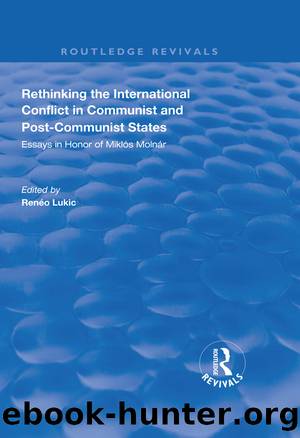Rethinking the International Conflict in Communist and Post-communist States by Reneo Lukic

Author:Reneo Lukic [Lukic, Reneo]
Language: eng
Format: epub
ISBN: 9781138327306
Barnesnoble:
Publisher: Taylor & Francis
Published: 2018-08-06T00:00:00+00:00
Yugoslavia as an Expression of the International Order
International relations have also played a determinant role in the disintegration of Yugoslavia, because the international context presided over its two step creation, with the first step occurring in 1918 and the second in 1945. Here again, the same two factors which led to its creation are evident: the presence of the Austro-Hungarian Monarchy and the Soviet bloc. If the Austro-Hungarian Monarchy had not disintegrated in 1918, Yugoslavia would never have been created. If the Soviet Union had not imposed its rule over Eastern Europe from 1944 on, Titoâs communist Yugoslavia would not have been possible. This twice confirms the impact of international actors on Yugoslaviaâs creation and illustrates the importance of the following question: if the Soviet bloc had not crumbled in 1989, would Yugoslavia have still disintegrated?
It appears that Yugoslaviaâs existence was conditioned by the balance of power in Europe. When in 1989 this international order disappeared, its continued survival was almost immediately called into question. If one examines the past, one is struck by the influence which the great powers exerted at all the turning points of Yugoslaviaâs history. In 1918 the creation of the Kingdom of the Serbs, Croats and Slovenes, a state bringing together the Southern Slavs from the Habsburg Monarchy (Slovenes, Croats and Bosnians) and Serbia and Montenegro, had been made possible by the defeat of the Austro-Hungarian Monarchy. A new balance of power emerged from the First World War and the Versailles Conference (1919), in which German domination of Central Europe was undermined by the creation of a number of states of an anti-German orientation (i.e. Czechoslovakia and Yugoslavia [Serbia], both of which had organised themselves into a Little Entente during the inter-war period as a support to the Franco-British alliance). The influence of France and Great Britain in the stability of the new Yugoslavia was expressed at all levels. Its creation was made possible by the Allied promises to Serbia in 191516 that it would be rewarded for its war efforts by being granted Southern Slav territories belonging to the Austro-Hungarian Monarchy. The promised territories were militarily conquered by a French-led offensive from Saloniki.17 Once created, Yugoslavia, in the form of an expanded Serbia, was largely dependent on French and British capital, investments and credits, with its situation being that of quasi-colonial dependence. The share of foreign capital was important: France provided 25% of it in 1937, and Great Britainâs share in mining exploitation amounted to 52%. The total share of foreign capital was particularly dominant in mining and industry, where it represented 69% in mining and 70% in the chemical industry. Not only was the share of foreign capital large, but the foreign debt was also considerable. In 1938, when the average revenue per inhabitant was sixty dollars, two thirds of that service income was diverted to the debt. Foreign support was essential to the existence of Yugoslavia, as foreign credits, mostly French (which Professor John B. Allcock calls âdiplomatic subsidiesâ)18 camouflaged its perpetual economic difficulties.
Download
This site does not store any files on its server. We only index and link to content provided by other sites. Please contact the content providers to delete copyright contents if any and email us, we'll remove relevant links or contents immediately.
Collaborating with Parents for Early School Success : The Achieving-Behaving-Caring Program by Stephanie H. McConaughy; Pam Kay; Julie A. Welkowitz; Kim Hewitt; Martha D. Fitzgerald(899)
Entrepreneurship Education and Training: The Issue of Effectiveness by Colette Henry Frances Hill Claire Leitch(672)
Adding Value to Policy Analysis and Advice by Claudia Scott; Karen Baehler(499)
Materializing the Middle Passage by Jane Webster;(497)
Race and American Political Development by unknow(490)
American Government and Politics Today by Steffen W. Schmidt Mack C. Shelley Barbara A. Bardes(487)
Sociological Perspectives of Health and Illness by Constantinos N. Phellas(479)
Human and Global Security : An Exploration of Terms by Peter Stoett(473)
Control Of Oil - Hardback by Kayal(468)
Advances in Child Development and Behavior, Volume 37 by Patricia J. Bauer(403)
The Catholic Church and European State Formation, AD 1000-1500 by Jørgen Møller(401)
The Disappearance of Rituals: A Topology of the Present by Byung-Chul Han(401)
The World According to China by Elizabeth C. Economy(387)
Theories of Counseling and Psychotherapy: A Case Approach by Nancy L. Murdock(381)
Left Is Not Woke by Susan Neiman(371)
Application of classical statistics, logratio transformation and multifractal approaches to delineate geochemical anomalies in the Zarshuran gold district, NW Iran by unknow(365)
Cross-Cultural Child Development for Social Workers by Lena Robinson(358)
Turkey's Relations with the West and the Turkic Republics: The Rise and Fall of the Turkish Model by Idris Bal(353)
Japan's Ainu Minority in Tokyo by Mark K. Watson(341)
